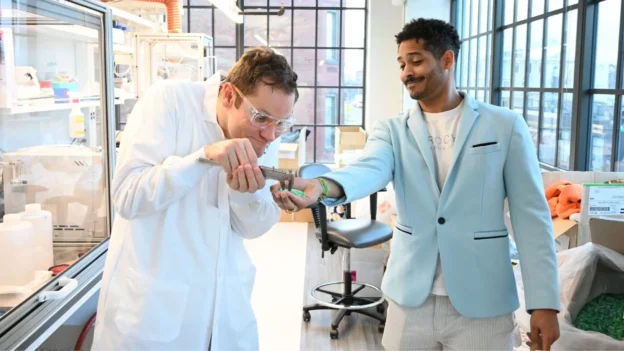In the industry, textile recycling remains one of the most complex tasks. Only 9% of plastics and 0.5% of textile garments are recycled globally. The main reason for this is the difficulty in processing composite materials such as blends of
Against this backdrop, U.S.-based startup MacroCycle is proposing a technical breakthrough that could change the situation. Its chemical recycling method allows textile waste to be broken down without the need for prior sorting, reducing costs, energy consumption and logistical barriers for industries that generate waste.
A molecular approach to recover useful polymers
The key innovation of the process lies in the use of circular structures called macrocycles. Instead of breaking polymers down to their basic state, MacroCycle forces them to reorganize into stable rings that can be easily separated from other materials. These rings are then opened and reassembled into new polymers ready to be reused as polyesters.
This method avoids energy- and chemical-intensive complete reprocessing, achieving remarkable energy efficiency: up to 80% less than producing virgin polyester from fossil fuels.
Textile recycling and economic viability in the fashion industry
MacroCycle, which emerged from MIT labs and is backed by Breakthrough Energy, is in the process of scaling up its technology. It currently produces 100-kilogram test batches and collaborates with fashion brands seeking to reduce their environmental impact without altering their production margins.
The most remarkable thing is that this solution makes it possible to obtain recycled polyester at the same cost as virgin plastic, eliminating one of the biggest obstacles to the mass adoption of sustainable materials.
industrial implications beyond the textile sector
Although the initial focus is on fashion, MacroCycle’s potential is applicable to other sectors that use difficult-to-recycle plastics. difficult-to-recycle plastics, such as packagingsuch as packaging and automotive. The possibility of implementing local chemical recycling plants also opens up opportunities to generate employment and reduce dependence on imported raw materials.
For MacroCycle’s CEO, Peña Feliz, the key is to change the market’s incentive game: “The transformation will not come from the oil companies. We have to make it more expensive for them not to change”.
Source and photo: MacroCycle via Ecoinventos

